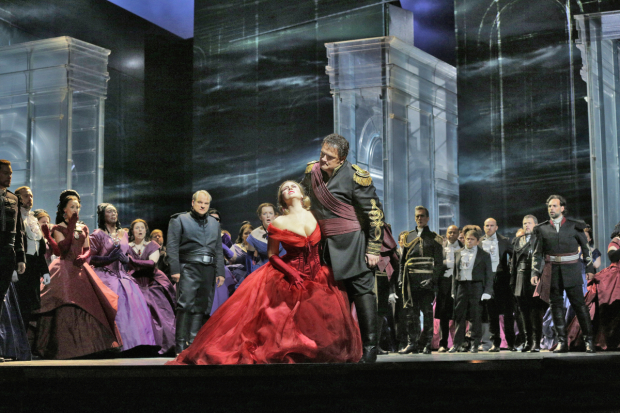Otello

(© Ken Howard/ Metropolitan Opera)
In opening a new season at the Metropolitan Opera, it's best to go with a proven masterpiece. Peter Gelb and company have done just that with Giuseppe Verdi's Otello, an opera that easily survives this new production's design missteps thanks to a stable of talented musicians. The penultimate work of the great man of Italian opera, Otello majestically encapsulates 50 years of compositional experience while also proving that an old dog can learn new tricks.
Otello premiered at La Scala in 1887 when the composer was 74 years old. By then, much of Verdi's canon looked passé compared to the dramatically integrated symphonic operas of Richard Wagner. Otello was Verdi's way of showing the world that he could play that game too, but with a characteristically Italian sense of melody and truthful human drama. Of course, he could do no better in that department than to draw from his favorite dramatist, William Shakespeare (whose Macbeth he adapted 40 years earlier).
The opera begins in the second act of the bard's tragedy: Otello (Aleksandrs Antonenko), the Venetian governor of Cyprus, returns to the island triumphant after destroying the Turkish fleet and surviving a violent storm. The people rejoice, but not Ensign Iago (Željko Lučić). He's still bitter about being passed up for promotion in favor of Cassio (the ruggedly handsome Dimitri Pittas). Iago schemes to turn Otello against Cassio by fabricating an affair between Cassio and Otello's wife, the saintly Desdemona (Sonya Yoncheva). This involves a lot of intrigue with a handkerchief. To everyone's despair, Otello falls for Iago's deception and becomes increasingly abusive toward his wife, finally smothering her in a jealous rage.
Much has been made about this being the first time at the Met that a white singer does not wear blackface while portraying the titular moor of Venice. Some have heralded the decision as long overdue, while others have bristled at the break with tradition. Not only does it work (Arrigo Boito's libretto always downplayed Otello's blackness anyway), it actually makes Otello more dramatically compelling: It's not as easy to dismiss our protagonist's jealousy merely as the product of "cultural differences" (which feels like a facile talking-point from an anti-immigration political party). Everyone in this story is undeniably Venetian. It also allows Antonenko to appear increasingly wan as jealousy physically consumes the once-ruddy Lion of Saint Mark.
Truly, Antonenko looks insane in this part: Moments of tender passion darken instantly to violent anger, Antonenko's soaring tenor crying out for the truth (as if he can ever rely on Iago for that). As Iago, Lučić is the epitome of evil, singing every line through a permanent glower. After his long "Credo," in which he tells us that he worships a cruel God, he gives a simple shrug at the audience, as if to say, "That's it." It's an appropriate gesture for Shakespeare's most irredeemable villain. Remarkably, Lučić manages to make Iago fun, bringing the house down with his acrobatic baritone during the rollicking drinking song "Inaffia l'ugola!"
Yoncheva's Desdemona is not nearly as amusing, nor does she have reason to be: She's clearly a woman resigned to her fate at the hands of erratic, unpredictable men. She sings her prayers like a Catholic martyr, high and clear for the heavens. Still, she musters some vocally powerful rebuttals in the third act, when Otello accuses her of unfaithfulness. Catherine Zuber brutally costumes her in a blood-red dress for this act — not the best color when you're trying to convince your husband that you're not a whore.
Much as he did in The King and I (which is currently playing next door at the Vivian Beaumont Theater), director Bartlett Sher manages to elicit raw, emotionally connected performances amid giant moving scenery and lavish stage pictures. Unfortunately, the design of Otello is far more uneven than that of the Tony Award-winning Rodgers and Hammerstein revival.
Certainly, there are bright spots: Zuber outfits the chorus in drab gray and teal, telling the story of sea-soaked peasantry while also allowing the brighter colors of the principals to really pop. Donald Holder's lighting also helps focus the eye, with several moments resembling Caravaggio paintings in their contrast and composition.
That's a godsend considering Es Devlin's inexplicable set of frosted glass houses. They lurch on and off stage, doing very little to illuminate the story but always getting in the way. The upstage's walls are dominated by Luke Halls' dynamic projections. At their best, they give us a sense of the perilous seas surrounding this island fortress. At their worst, they look like a screen saver for Windows 98.
Despite these less than ideal surroundings, the Met chorus sounds magnificent. Conductor Yannick Nézet-Séguin achieves near-perfect balance, especially during the thrilling Act 3 septet: Each principal comes across pristinely with the chorus accenting underneath.
Nézet-Séguin and Sher have obviously worked closely to realize Verdi's vision of musical drama: A vampiric Otello approaches Desdemona's bed and grabs a pillow to the menacing sound of a string tremolo. Suddenly, a wave of merciful woodwinds causes him to abandon his weapon and melt into a kiss. Not every moment in Otello is as dramatically and musically cohesive, but the ones that are offer a divine sense of opera's full potential.
Click below to see a scene from Otello at the Metropolitan Opera:











